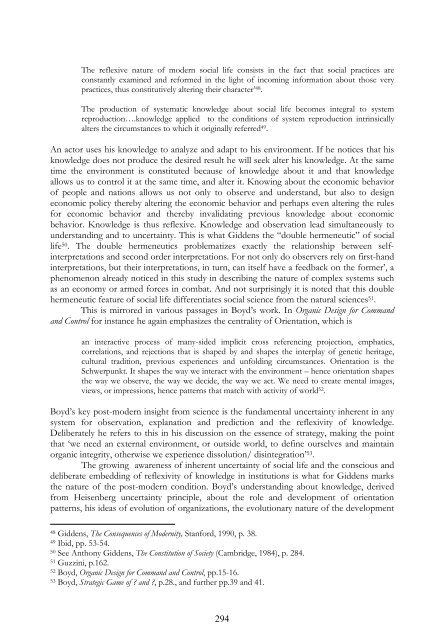Science, Strategy and War The Strategic Theory of ... - Boekje Pienter
Science, Strategy and War The Strategic Theory of ... - Boekje Pienter
Science, Strategy and War The Strategic Theory of ... - Boekje Pienter
Create successful ePaper yourself
Turn your PDF publications into a flip-book with our unique Google optimized e-Paper software.
<strong>The</strong> reflexive nature <strong>of</strong> modern social life consists in the fact that social practices areconstantly examined <strong>and</strong> reformed in the light <strong>of</strong> incoming information about those verypractices, thus constitutively altering their character’ 48 .<strong>The</strong> production <strong>of</strong> systematic knowledge about social life becomes integral to systemreproduction….knowledge applied to the conditions <strong>of</strong> system reproduction intrinsicallyalters the circumstances to which it originally referred 49 .An actor uses his knowledge to analyze <strong>and</strong> adapt to his environment. If he notices that hisknowledge does not produce the desired result he will seek alter his knowledge. At the sametime the environment is constituted because <strong>of</strong> knowledge about it <strong>and</strong> that knowledgeallows us to control it at the same time, <strong>and</strong> alter it. Knowing about the economic behavior<strong>of</strong> people <strong>and</strong> nations allows us not only to observe <strong>and</strong> underst<strong>and</strong>, but also to designeconomic policy thereby altering the economic behavior <strong>and</strong> perhaps even altering the rulesfor economic behavior <strong>and</strong> thereby invalidating previous knowledge about economicbehavior. Knowledge is thus reflexive. Knowledge <strong>and</strong> observation lead simultaneously tounderst<strong>and</strong>ing <strong>and</strong> to uncertainty. This is what Giddens the “double hermeneutic” <strong>of</strong> sociallife 50 . <strong>The</strong> double hermeneutics problematizes exactly the relationship between selfinterpretations<strong>and</strong> second order interpretations. For not only do observers rely on first-h<strong>and</strong>interpretations, but their interpretations, in turn, can itself have a feedback on the former’, aphenomenon already noticed in this study in describing the nature <strong>of</strong> complex systems suchas an economy or armed forces in combat. And not surprisingly it is noted that this doublehermeneutic feature <strong>of</strong> social life differentiates social science from the natural sciences 51 .This is mirrored in various passages in Boyd’s work. In Organic Design for Comm<strong>and</strong><strong>and</strong> Control for instance he again emphasizes the centrality <strong>of</strong> Orientation, which isan interactive process <strong>of</strong> many-sided implicit cross referencing projection, emphatics,correlations, <strong>and</strong> rejections that is shaped by <strong>and</strong> shapes the interplay <strong>of</strong> genetic heritage,cultural tradition, previous experiences <strong>and</strong> unfolding circumstances. Orientation is theSchwerpunkt. It shapes the way we interact with the environment – hence orientation shapesthe way we observe, the way we decide, the way we act. We need to create mental images,views, or impressions, hence patterns that match with activity <strong>of</strong> world 52 .Boyd’s key post-modern insight from science is the fundamental uncertainty inherent in anysystem for observation, explanation <strong>and</strong> prediction <strong>and</strong> the reflexivity <strong>of</strong> knowledge.Deliberately he refers to this in his discussion on the essence <strong>of</strong> strategy, making the pointthat ‘we need an external environment, or outside world, to define ourselves <strong>and</strong> maintainorganic integrity, otherwise we experience dissolution/ disintegration’ 53 .<strong>The</strong> growing awareness <strong>of</strong> inherent uncertainty <strong>of</strong> social life <strong>and</strong> the conscious <strong>and</strong>deliberate embedding <strong>of</strong> reflexivity <strong>of</strong> knowledge in institutions is what for Giddens marksthe nature <strong>of</strong> the post-modern condition. Boyd’s underst<strong>and</strong>ing about knowledge, derivedfrom Heisenberg uncertainty principle, about the role <strong>and</strong> development <strong>of</strong> orientationpatterns, his ideas <strong>of</strong> evolution <strong>of</strong> organizations, the evolutionary nature <strong>of</strong> the development48 Giddens, <strong>The</strong> Consequences <strong>of</strong> Modernity, Stanford, 1990, p. 38.49 Ibid, pp. 53-54.50 See Anthony Giddens, <strong>The</strong> Constitution <strong>of</strong> Society (Cambridge, 1984), p. 284.51 Guzzini, p.162.52 Boyd, Organic Design for Comm<strong>and</strong> <strong>and</strong> Control, pp.15-16.53 Boyd, <strong>Strategic</strong> Game <strong>of</strong> ? <strong>and</strong> ?, p.28., <strong>and</strong> further pp.39 <strong>and</strong> 41.294
















